Rosehip - a genus of plants in the Pink family (Rosaceae), widely used in traditional medicine recipes, due to its many medicinal properties. This medicinal plant was already known to Hippocrates, and many peoples of the world used the plant for preparation of decoctions, tinctures, balms, ointments and other means for use in folk healing practice.
Plant-based preparations are most often used to strengthen the cardiovascular, digestive and urinary systems of the human body.
Rosehip is able to provide the body with a set of essential vitamins and minerals, and even after drying it does not lose its beneficial properties.
Record content:
- 1 Chemical composition
-
2 Useful properties, indications for admission
- 2.1 For colds, flu, ARVI
- 2.2 With hypertension and vascular disease
- 2.3 With blood diseases
- 2.4 For immunity
- 2.5 Diseases of the joints and cartilage tissues
- 2.6 Kidneys and urinary system
- 3 Harm and contraindications
-
4 Features, norms of use
- 4.1 For adults
- 4.2 For children
- 4.3 During pregnancy and lactation
-
5 How to make a rosehip decoction
- 5.1 Fresh berries
- 5.2 From dry fruits
- 5.3 Of petals
- 5.4 From the roots
- 5.5 From the leaves
-
6 Recipes and applications in traditional medicine
- 6.1 With diabetes mellitus
-
6.2 With pancreatitis
- 6.2.1 During the acute course of the disease
- 6.2.2 During remission
- 6.3 With gastritis
- 6.4 For constipation
- 6.5 With gout
- 6.6 With colitis
- 6.7 For the liver
- 6.8 With hemorrhoids
- 6.9 With cholecystitis
-
6.10 Under pressure
- 6.10.1 With hypertension
- 6.10.2 With hypotension
- 6.11 With arrhythmia
- 6.12 Tincture universal to strengthen the immune system
- 6.13 Decoction for otitis media
- 7 When to collect and how to store the fruit?
- 8 Rosehip video
Chemical composition
Rosehip (medicinal properties and its use are very diverse) is a familiar and fairly common plant with a unique biochemical composition.
100 g of fresh fruit (this is 109 kcal) contains:
- 60 g of water;
- 22.4 g carbohydrates (which is 8% of the daily value);
- 0.7 grams fat (1 percent DV)
- 1.6 g protein (about 2%);
- 10.8 g dietary fiber (54%).
The content of vitamins and microelements in 100 g of fresh rose hips:
| Vitamins | Trace elements | ||||
| Name | Quantity | % of the norm | Name | Quantity | % of the norm |
| Vitamin A, RE | 434 μg | 48,2 | Potassium | 23 mg | 1 |
| Beta Carotene | 2.6 mg | 52 | Calcium, | 28 mg | 3 |
| Thiamine (B1) | 0.05 mg | 3,3 | Magnesium | 8 mg | 2 |
| Riboflavin | 0.13 mg | 7,2 | Sodium | 5 mg | 0 |
| Choline (B4) | 12 mg | 2,4 | Sulfur | 16 mg | 1,6 |
| Vitamin B5 | 0.8 mg | 16 | Phosphorus | 8 mg | 1 |
| Pyridoxine | 0.076 mg | 3,8 | Iron | 1,3 mg | 7,2 |
| Vitamin C | 650 mg | 722,2 | Manganese | 1.02 mg | 51 |
| Vitamin E | 1.7 mg | 11,3 | Copper | 113 mcg | 11,3 |
| Phylloquinone | 25.9 mcg | 21,6 | Zinc | 0.25 mg | 2,1 |
| Vitamin PP | 0.7 mg | 3,5 |
Vitamin C present in rose hips is well tolerated even when synthetic ascorbic acid or ascorutin cause exacerbation of diseases, for example, with allergic dermatoses.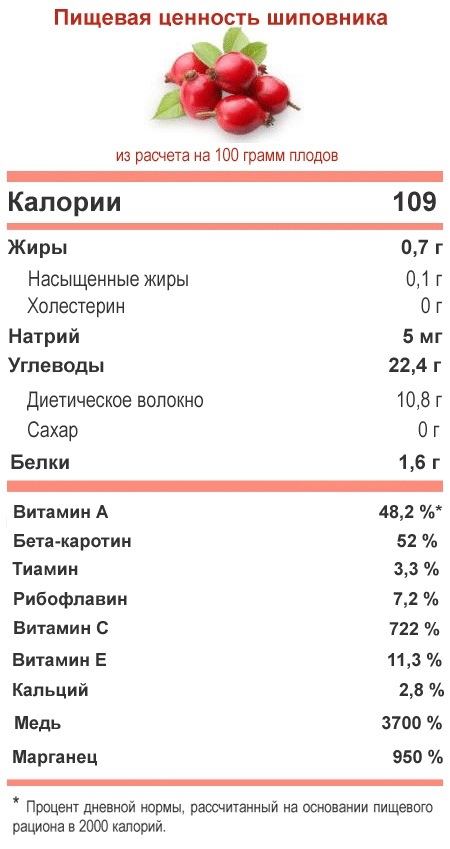
The fruits of the plant also contain:
- Apple acid;
- flavonoids;
- betulin;
- powerful natural antioxidants, isoquercitrin;
- xanthophyll and lycopene;
- tannins;
- pectins.
Useful properties, indications for admission
Rosehip, medicinal properties and application of which are determined by its rich biochemical composition, has such beneficial effects on the body:
- anti-inflammatory;
- multivitamin;
- antioxidant;
- regenerating;
- diuretic (does not irritate the renal epithelium) and choleretic;
- antihelminthic.
In addition, preparations based on this plant help:
- improve metabolism;
- strengthen the immune system (rose hips are known as a general tonic: its fruits contain 10 times more ascorbic acid than currants and 50 times more than lemons);
- increase blood clotting and normalize blood pressure;
- stimulate the function of hematopoietic organs and the activity of the endocrine glands;
- regulate the activity of the digestive tract;
- reduce the permeability of the vascular wall.
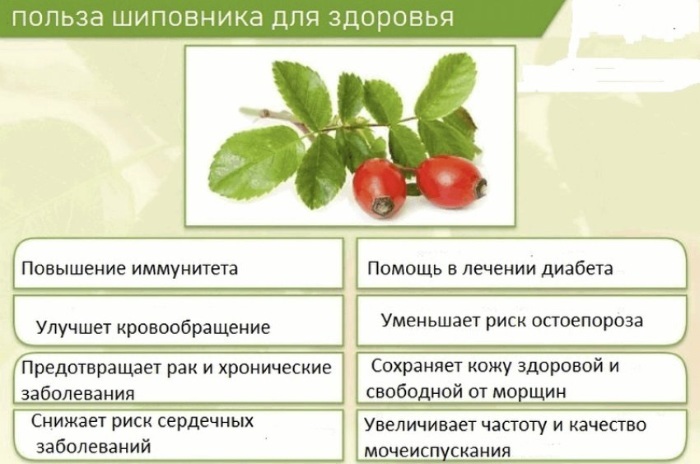
Rose hip. Healing properties
The beneficial properties of the plant are used not only in folk but also in official medicine.
For colds, flu, ARVI
High content of ascorbic acid, other vitamins and the ability to exhibit anti-inflammatory the action allows the use of rose hips in inflammatory processes affecting the respiratory organs systems.
With hypertension and vascular disease
The use of decoctions, tinctures and infusions of rosehip is useful for disorders in the work of the heart and blood vessels. Berries with a multivitamin composition strengthen the walls of blood vessels, help to normalize blood pressure. At the same time, taking rose hips is relevant both at high and low pressure (it depends on the method of preparation and dosage).
With blood diseases
The mineral composition contained in the plant (for example, iron, copper) has a positive effect on hematopoiesis and blood composition, which greatly helps to fight anemia.
For immunity
Rosehip acts as a general tonic. A decoction in a steam bath, saturated with vitamins and minerals, helps with weakened immunity and vitamin deficiencies.
Diseases of the joints and cartilage tissues
Rosehip contains trace elements (for example, copper), vitamins, and other natural elements necessary to maintain connective and bone tissue in normal condition.
Kidneys and urinary system
When using rose hips as a diuretic (unlike many synthetic drugs), the body is not deprived of vitamin and mineral reserves.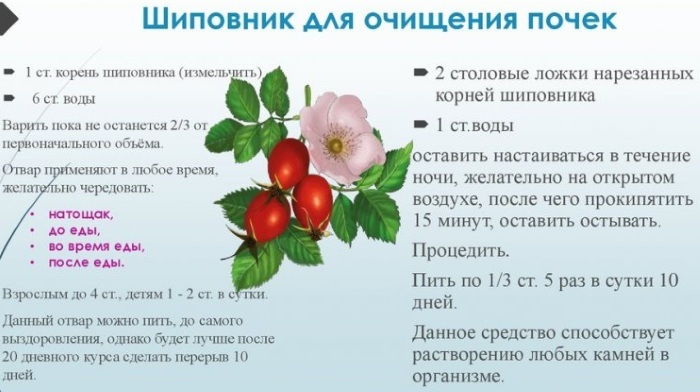
Due to frequent urination, toxins, toxins, radionuclides are eliminated, puffiness is removed, and high content of vitamin C and organic acids promotes crushing and removal of stones from kidneys.
Harm and contraindications
Rosehip (medicinal properties and its use are widely known) is a plant that requires careful use, as it has rather serious contraindications.
These include:
- a stomach or intestinal ulcer;
- gastritis (with high acidity);
- high levels of ascorbic acid in the body;
- heart failure;
- psoriasis;
- endocarditis.
Rosehip should be used with caution for those who have a tendency to thrombophlebitis, constipation, or have pancreatic diseases.
Long-term use of rosehip-based drugs is not recommended, as this can adversely affect the condition of the liver. Therefore, you should not use rose hips for severe liver diseases such as cirrhosis.
It should be said that certain inconveniences when taking rosehip infusions and decoctions can occur in people with increased sensitivity of the teeth. The fruits contain acid that can destroy the enamel, so it is advisable to rinse your mouth after each intake of infusion, decoction or drink them through a straw.
Features, norms of use
Rosehip can be consumed in various dosage forms (powders, ointments, decoctions, infusions, or as tea).
For adults
For adults, in the absence of contraindications, the average daily intake of decoctions and infusions from rosehip is considered to be 200 ml. This portion can be divided into 2-3 doses throughout the day. Tea made from this plant can be drunk up to 400-500 ml per day, which is quite harmless.
The average treatment course is 2-3 weeks. For men to improve potency, in the treatment of prostate adenoma, courses are recommended, lasting about 1 month. After 30 days, a break should be taken, which can be up to 6 months.
For children
Rosehip, the medicinal properties and the use of which as a fortifying or therapeutic agent for children are associated with the rich content in it vitamins and their successful combination, you can take a day:
- 2 tbsp. l. for babies from one to three years old;

- 4 tbsp. l. at the age of 3-5 years;
- about 100 ml for children from 6 years old.
During pregnancy and lactation
Rosehip can be consumed during pregnancy. It boosts immunity and improves well-being. It is a real source of vitamins and minerals, providing the female body with the necessary support.
Rosehip is also beneficial for breastfeeding. Its fruits contain enough ascorbic acid and carotene to provide a woman with extra energy. A decoction of the fruits is able to enhance lactation. It should be taken in an amount of 250-300 ml half an hour before feeding.
It should be introduced very carefully into the diet of a breastfeeding woman, starting with a few sips. Rosehip drink will not only increase the amount of milk, but also replenish the female body with substances that were lost during pregnancy.
How to make a rosehip decoction
Most often, infusions and decoctions of medicinal raw materials are used for medicinal purposes. However, decoctions have a higher concentration of nutrients and can be prepared from all parts of the rose hips.
Fresh berries
The difficulty of preparing a decoction or rosehip infusion from fresh fruits is that the collection of fruits lasts only 2-3 weeks of September, when the berries have reached full maturity.
- To prepare a decoction or infusion from fresh raw materials, the fruits should first be thoroughly rinsed and removed from the villi in order to avoid irritation of the mucous membranes while taking the drug.
- Next, you need to divide each berry in half and remove the seeds (you can use finely chopped berries with seeds).
- It is better to insist berries in a thermos: 1 tsp. l. fruits are poured with a glass of boiling water and insisted for 1 tsp.
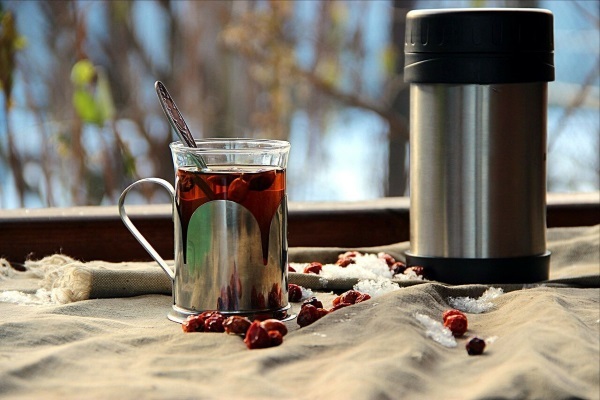
- Then the infusion is filtered through several layers of gauze.
The daily dose of the drink is 200 ml, which should be divided into 2-3 doses. In the morning for a tonic effect, you can add lemon juice, and in the evening it is better to mix a warm infusion with honey.
From dry fruits
To prepare the broth, take 100 g of dried berries and chop them. Then dry raw materials must be poured into 1 liter of boiling water and boiled for 2-3 minutes. It is recommended to take a filtered broth for gastritis, 200 ml 3 times a day.
Advice. It is better to cook fresh fruit decoction every day.
Of petals
It is better to prepare an infusion from the petals: pour 1 tbsp. l. chopped plant petals with one glass of boiling water and leave under the lid for half an hour. After that, the infusion should be filtered and consumed depending on the purpose.
It is used as an anesthetic and bactericidal agent in dermatology. It is also effective in inflammatory diseases of the eyes, for rinsing the mouth.
From the roots
For medicinal purposes, the roots of the plant are also used, from which various dosage forms are prepared.
To extract more nutrients, it is best to prepare a decoction from the root. For its preparation 2 tbsp. l. the chopped root is boiled for 15 minutes. in 2 st. water, insist until completely cooled. Take such a decoction three times a day before meals for 1 tbsp. with gallstone disease, diseases of the urinary organs and malaria.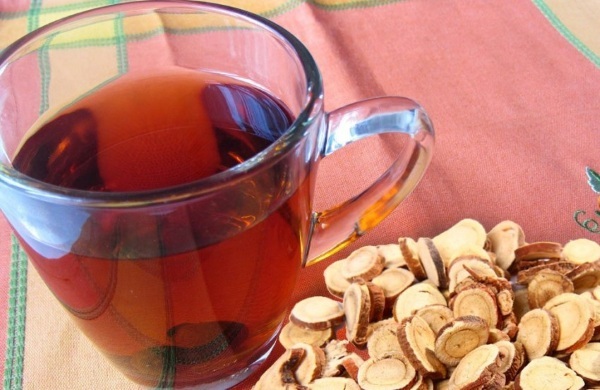
Among the recipes for traditional medicine, there are also ways to prepare infusions from rosehip roots:
- 1 tbsp. l. roots, crushed to a powdery state, pour 250 ml of boiling water, wrap the dishes with a warm blanket and leave for 5 hours.
- Then the resulting drink is filtered and taken for 30 minutes. before meals in equal portions throughout the day.
Reception is indicated for inflammation of the bladder, gastrointestinal disorders, to improve bile secretion, relieve pain and spasms.
Note. Improper use of preparations based on rosehip root can provoke constipation, so they it is recommended to drink together with decoctions of herbs that prevent increased gas production (fennel, dill).
From the leaves
Rosehip leaves are medicinal raw materials, from which it is more expedient to prepare infusions. For this, 1 tbsp. l. leaves are insisted for 10 minutes. in 1 tbsp. boiling water and drink 1 tbsp. in a day.
The leaves contain a large amount of vitamin C, which is why they are often used for colds. Also, such a remedy improves the motor function of the stomach, soothes stomach pains, reduces gas production, and, in case of diarrhea, reduces the number of urges.
Recipes and applications in traditional medicine
All parts of the rosehip are very widely used in the medical practice of traditional medicine.
With diabetes mellitus
Rosehip can be used for type 2 diabetes. With regular use, you can achieve:
- lowering sugar levels;
- improving metabolism;
- maintaining the normal functioning of the pancreas;
- removal of stones from the gallbladder;
- improvement of the general condition.
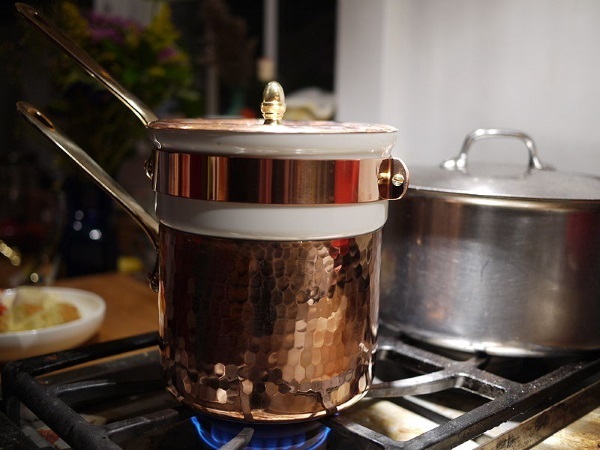
To prepare the drug, you need to pour 20 g of dried berries with 500 ml of boiling water and put everything on for 20 minutes. to a water bath. After this, the agent should be removed from the heat and left overnight to infuse. Drinking the remedy (it will turn out to be about 2 tbsp.) Is recommended several times a day half an hour before meals.
However, you need to listen to your condition, since rose hips contain up to 8% sugar.
With pancreatitis
A decoction based on rosehip has a positive effect on the digestive organs, without irritating the mucous membranes of the stomach and intestines:
- it reduces pain;
- relaxes smooth muscles, facilitating the removal of enzymes from the ducts;
- actively restore damaged tissue;
- stabilizes the activity of the pancreas;
- contributes to the normalization of the outflow of bile and the improvement of the liver.
There are various recipes for making a decoction, depending on the stage of the disease.
During the acute course of the disease
During this period, you should take the drug prepared in this way: 200 g of dry berries should be poured with 100 ml of boiling water and for 15 minutes. put in a water bath. Then the infusion should be cooled a little and the liquid should be squeezed out well. Before use, it should be diluted with boiled water in equal proportions. The medicine should be consumed no more than ¼ tbsp. no more than 3 times a day.
Note. With severe inflammation of the pancreas during an exacerbation, it is better to limit the use of rosehip drinks or refuse them altogether.
During remission
When the disease recedes, you can prepare the remedy according to the following recipes:
- Put 100 g of dried fruits in a thermos, pour 100 ml of boiling water over them and leave for 2 hours. This infusion is an excellent prophylactic agent.
- During the period of remission, you can prepare a decoction from the roots. To do this, pour 50 g of dry crushed roots with a glass of water and boil for 20 minutes. The drained medicinal fluid is taken by sip 3 times a day.
Note. Sugar or honey should not be added to decoctions and infusions that are recommended for pancreatitis, since the pancreas can react negatively to these sweeteners, and this will only worsen situation.
With gastritis
With gastritis, rosehip can be used as an analgesic, bactericidal and vasoconstrictor. In addition, the plant effectively fights inflammation, promotes the regeneration of tissues and mucous membranes.
Organic acids lead to a normal level of gastric acidity, which is especially important in gastritis. However, the high acid content of rose hips makes it possible to use it only for gastritis with low acidity.
- In case of gastritis with low acidity, you should take 100 g of dried fruits (they should be crushed beforehand), pour them with 1 liter of water and cook for 2-3 minutes. After that, the broth should be cooled and filtered. It is recommended to drink it 200 ml 3 times a day.
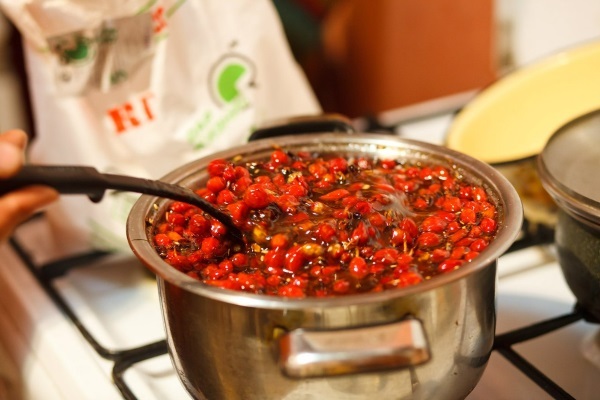
- You can prepare the product using a different recipe. For this, 2 tbsp. l. fruits, pour 500 ml of boiling water and let it brew for 8 hours. Take such an infusion of 1/2 tbsp. 2 times a day (preferably half an hour before meals).
For constipation
It is not recommended to use rose hips if you have a tendency to constipation. Treatment with decoctions and rosehip infusions can only aggravate the condition. To avoid this, mild laxatives and drugs that reduce flatulence should be used along with rose hips.
With gout
With gouty arthritis, polyarthritis, folk medicine offers the following recipe: a dozen young branches of rose hips (5 cm in length and 0.5 cm in diameter) need to be poured with 1 liter of water and boiled for about half an hour. When the broth cools down, strain it and drink it instead of water throughout the day.
With colitis
Rosehip has anti-inflammatory, astringent and strengthening properties, therefore it is useful for various intestinal inflammations, such as colitis (inflammation of the lining of the colon). Microclysters from broths and rosehip infusions help well.
For oral administration, you can use the following recipe: 20 g of dry, carefully chopped berries, pour 300 ml of boiling water and insist 4 tsp. After that, filter the infusion and drink 100-150 ml twice a day.
For the liver
For diseases of the liver, kidneys, bladder, an aqueous extract of rose hips is useful. To prepare it, 50 g of crushed fruits are placed in a thermos, poured with a liter of boiling water and left to infuse for 1/2 day. This infusion should be consumed up to 2-3 tbsp. a day half an hour before meals.
Among the folk remedies aimed at cleansing the liver, one of the best is considered to be a napar (infusion) from a mixture of rose hips and oats.
To prepare a classic recipe, you need 1 tbsp. l. rose hips and 1 tbsp. l. grind oats in a blender or coffee grinder. Next, the resulting composition should be placed in a thermos and pour 1 liter of boiling water. The composition should be insisted for half a day. The result is a swollen mass consisting of oats and rose hips, which should be squeezed out to obtain a medicinal infusion.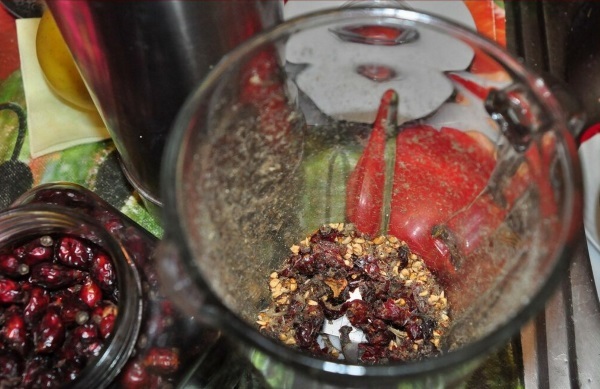
The resulting drug is recommended to be taken warm on an empty stomach (or after 2 hours. after eating) 1 tbsp. It is necessary to carry out 3 courses of 10 days with a 2-3-week break after each 10-day intake.
This restorative composition also has a beneficial effect on the pancreas and spleen.
With hemorrhoids
With hemorrhoids, the medicinal effect is provided by an ointment based on rosehip and propolis. To prepare it, melt 1 part of propolis and 10 parts of rosehip oil in a water bath. When the components are melted, they should be mixed and cooled. The resulting ointment is applied once a day to a sore spot for 2 weeks.
With cholecystitis
Rosehip preparations are also recommended for cholecystitis. However, in the presence of stones in the gallbladder, it is better to refuse treatment with drugs based on this plant, since it is possible to provoke a blockage of the bile ducts.
It is better to cook the infusion in a thermos in order to get the maximum benefit from the raw materials. For this, 2 tbsp. l. chopped fruits are poured overnight with 1 tbsp. boiling water. After filtering, take 0.5-1 tbsp. drink 2 times a day. It is recommended to drink the infusion warm in the morning on an empty stomach.
The resulting product can improve the motility of the gallbladder, the quality of bile and the work of the gastrointestinal tract.
Under pressure
The fruits can be eaten both fresh and dried. For example, at the end of summer, you can eat several berries a day as a dessert, and at other times of the year use dried rose hips.
For hypertension, it is advisable to take water-based drugs, as they provide sedation action and reduce pressure indicators, and alcohol tinctures in this case are categorically contraindicated.
With low blood pressure, observing the dosage, alcohol tinctures can be used. They improve blood circulation and slightly increase blood pressure. However, you should not consume rose hips or preparations based on it constantly or in large quantities, as this will lead to a further decrease in pressure.
With hypertension
To prepare a remedy that helps with hypertension, 2 tbsp. l. of dried fruits, pour a glass of boiling water and leave for 2 hours. for insisting. The resulting infusion should be drunk during the day, half a glass after meals.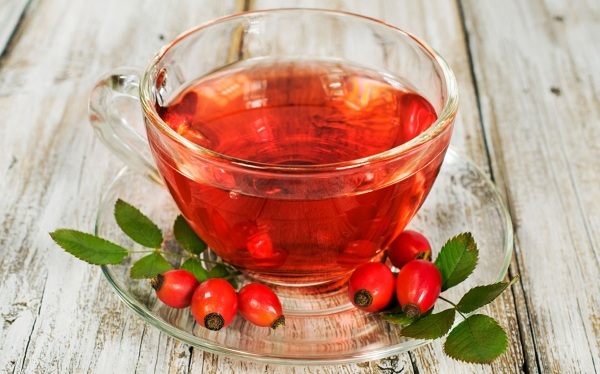
For winter, you can prepare a delicious medicine that can be given even to children in small quantities. To prepare it, you need to wash 1 lemon, chop finely with a knife or pass through a meat grinder. Add to it 1 tbsp. l. fresh rose hips and cranberries (also pre-chopped).
The resulting vitamin mixture must be poured with 1 tbsp. liquid honey, mix, transfer to a jar and refrigerate. Such a remedy is recommended to eat 1 dessert spoon several times a day with a glass of warm water.
With hypotension
Rosehip is a plant, the medicinal properties of which are useful for hypotension, if you use alcohol tincture. To cook it, you need 4 tbsp. l. chopped berries pour 500 ml of vodka. The drug should be infused for 10 days in a dark, cool place. It is recommended to take the tincture for 1 tsp. l. before meals 3 times a day for 3 weeks. The course can be repeated in 2-3 months.
With hypotension, an aqueous infusion of rosehip and sage works well. For its preparation, you should take 1 tbsp. l. chopped rose hips and sage herbs. Vegetable raw materials need to be poured with 2 tbsp. boiling water and leave to infuse for 1 tsp. It is recommended to drink the infusion 4-5 times a day according to Art. l. (the infusion can be slightly sweetened with honey).
With arrhythmia
With arrhythmias and other problems of the cardiovascular system, traditional medicine, prepared on the basis of wild rose and hawthorn berries, helps.
Tincture universal to strengthen the immune system
A popular fortifying agent offered by traditional healers is rosehip tincture. For its preparation 1 tbsp. dried (if fresh raw materials are used) or crushed dry fruits of the plant are mixed with 1-1.5 tbsp. sugar, all pour 3 tbsp. alcohol (70%) and exposed for 5 days in the sun.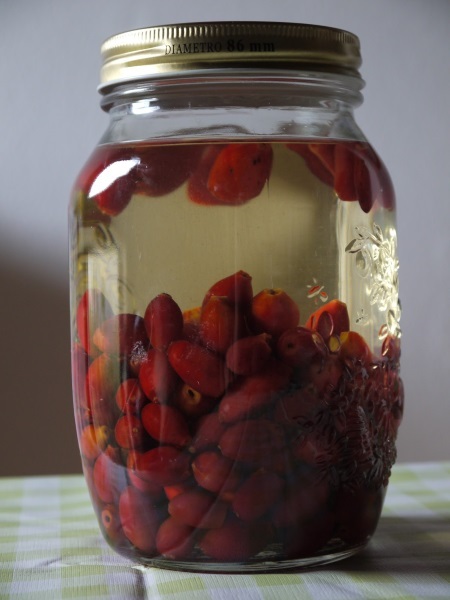
On the 6th day, another 2-3 tbsp is added to the tincture. vodka (40%) and again exposed to sunlight for 5 days. After that (on the 10th day from the start of preparation), the composition is filtered, slightly squeezing.
This universal tincture is recommended to be taken 15 g 2 times a day after meals.
The use of tincture is not recommended:
- with hypertension and heart disease;
- children, pregnant and breastfeeding;
- with thrombophlebitis;
- with blood diseases;
- with ulcers and gastritis with high acidity;
- with individual intolerance.
Decoction for otitis media
With otitis media, a folk recipe based on rose hips can be used as an additional remedy to the main treatment. To do this, drip into the ear a mixture consisting of a strong infusion of the fruits of this plant (2 handfuls per glass of boiling water), 30 ml of fresh carrot juice and 1 tbsp. l. cream. You should drip 3 drops a day.
When to collect and how to store the fruit?
Rosehip (useful properties and its use with the desired therapeutic effect depends not only on the composition) is a medicinal raw material that requires proper preparation and storage.
- The collection of raw materials should be carried out in the most favorable places from an environmental point of view.
- The fruit must be harvested when it is fully ripe (unripe berries contain less nutrients). It is equally important to have time to collect the fruits before frost: even a slight freezing significantly reduces their beneficial properties (for this reason, the rose hips cannot be frozen for storage).
- It is best to store plant materials in a dried form. The berries are harvested in dry weather, spread in a thin layer on a baking sheet and dried in the oven or in a special dryer. Qualitatively dried fruits retain their natural color - orange or reddish brown.
- The fruits should be stored in linen, cotton bags or a tightly closed glass jar. The berries must be well dried, since literally one underdried berry can ruin the entire harvest.
- You can store hawthorns for up to 2 years. Throughout this period, it retains its useful properties.
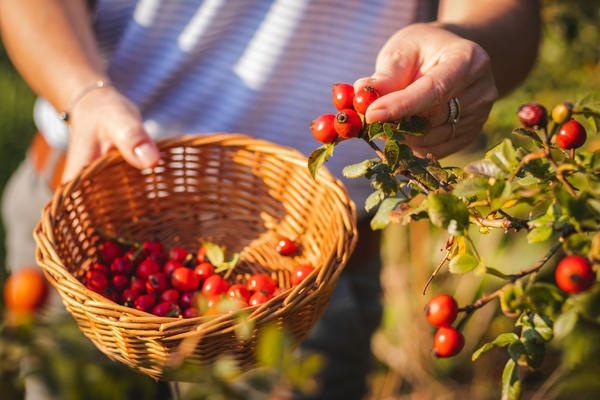
Rosehip is a plant that has been used by folk and official medicine as an effective medicine for many years.
Its properties allow it to be used also in cosmetology and as a food product, from which many tasty and healthy delicacies can be prepared. And do not forget that in terms of the content of vitamins and microelements, rosehip surpasses many fruits and vegetables.
Author: Irina Zhuravka
Rosehip video
Why rose hips are useful:



